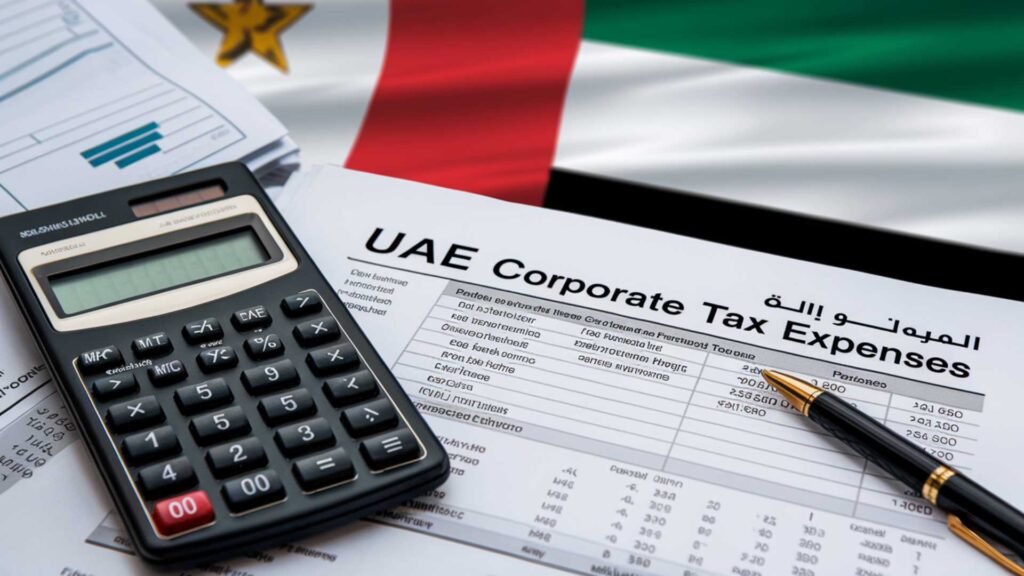Understanding the 9% CT and who it applies to:
The UAE made a significant change to its tax system in 2023 when it implemented a 9% corporate tax on company profits over AED 375,000. It is more crucial now than ever for corporations to remain well-informed and ready in 2025, as UAE corporate tax compliance regulations are becoming more stringent, and penalties are progressively applied more severely.
Mainland businesses and Free Zone entities that don’t fit into the eligibility criteria are the primary targets of this corporate tax. Nonetheless, some industries—such as government-owned businesses, oil and gas firms, and eligible Free Zones—may qualify for exemption or receive special consideration.
Why does compliance matter in 2025?
Late registration, filing, or tax payments can result in serious monetary penalties, legal complications, and even compromise one’s reputation. Businesses need to take the initiative to ensure complete compliance in light of the Federal Tax Authority’s (FTA) stricter regulations.
Who must comply with the UAE Corporate Tax in 2025?
Any company with net profits exceeding AED 375,000 per year is liable for the UAE corporate tax. Although they might still need to file and report, businesses under the specified limit are at present exempt from paying Corporate Tax.
Entities required to comply
· Mainland companies under UAE jurisdiction
Regardless of industry or scale, any company registered and functioning on the UAE mainland that has taxable income above the threshold is required to comply.
· Free Zone Entities operating with mainland clients or conducting businesses outside their zone
Even though Free Zones offer particular tax incentives, companies that deal with the mainland or don’t fit the “qualifying” Free Zone requirements still have to pay corporate tax on their applicable income.
· MNC branches within the UAE territory
Regardless of double taxation treaties or sector-specific exemptions, foreign businesses operating in the UAE are required to comply when their UAE-based profits surpass AED 375,000.
· Freelancers or Solopreneurs with a trade license and profits above the limit
Consultants, creators, and digital service providers are examples of self-employed individuals with trade licenses who are accountable when their overall profit exceeds the taxable threshold.
Exempted businesses
· Government-owned businesses
Under certain circumstances, organizations owned by the UAE government that engage in autonomous or stipulated operations are exempt.
· Oil and gas sector
These businesses are frequently exempt from the federal 9% CT and are liable to a different Emirate-level taxation system.
· Eligible Free Zone Businesses
Businesses that operate in a free zone can still benefit from 0% corporate tax, only if they adhere to stringent guidelines, like keeping a sizable operation inside the zone and refraining from engaging in illegal operations associated with the mainland.
Essential Corporate Tax Compliance Checklist
Stay ahead with these must-do actions for 2025 corporate tax compliance.
Here’s a simplified corporate tax checklist UAE to help businesses stay on track:
1. Corporate Tax Registration with FTA – Regardless of whether the earnings are less than AED 375,000, all taxable businesses are required to register with the Federal Tax Authority.
2. Obtain and maintain TRN – Companies are provided a Tax Registration Number upon registration. All tax filings and correspondence must include this number.
3. Maintain proper accounting records – According to FTA regulations, all businesses must keep accurate and transparent financial data for at least the last seven years.
4. Prepare and submit annual financial statements – These financial statements ought to accurately depict the business’s performance and comply with recognized accounting guidelines, such as IFRS.
5. Calculate taxable income accurately – Make sure that your estimates account for authorized deductions and do not include exempt profits.
6. File corporate tax returns on time – Returns have to be submitted within 9 months of the end of the company’s fiscal year. Penalties could be imposed for missing this deadline.
7. Pay due taxes before the deadline – To prevent penalties or interest charges, tax payments have to be submitted within the same 9-month deadline.
8. Appoint a CT consultant (optional but recommended) – Although it is not required, working with a corporate tax consultant in Abu Dhabi or the appropriate emirate can streamline the procedure and help you avoid expensive errors.
Common Mistakes to Avoid in 2025
Steer clear of these pitfalls that could seriously harm your company.
1. Late or missed registration –
Many businesses hold off until they reach their profit threshold; however, doing so may result in late payments or legal concerns.
2. Misclassifying income or exemptions –
Your Free Zone status may be revoked if you fail to declare mainland revenue or consider non-qualifying income to be exempt.
3. Failing to maintain adequate documentation –
Tax computations can get challenged, and audits turn into an ordeal with a lack of clear records.
4. Ignoring Free Zone compliance conditions –
Free Zone businesses must strictly follow the guidelines to benefit from 0% tax. The exemption could be nullified by the slightest violation.
5. Not consulting with a tax advisor –
Inadequate professional advice may result in neglected liabilities or inaccurate filings, which an advisor could effortlessly avoid.
Final Thoughts: Staying Ahead with Smart Compliance
Meticulous and adequate preparation now can safeguard future pressure, time, and money.
As UAE corporate taxation develops, maintaining compliance now involves operating a transparent, legitimate business rather than merely avoiding fines. Correct reporting, prompt registration, and preparation will safeguard your financial standing and reputation.
You can securely navigate complex regulations by working with a corporate tax consultant in Abu Dhabi. Long-lasting viability is ensured by conforming to UAE corporate tax compliance regulations, regardless of the scale of your business.
It’s time to act early in 2025—your business and your future self will thank you.


